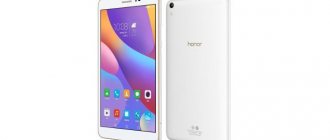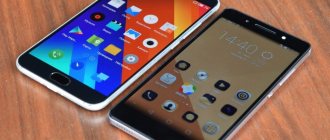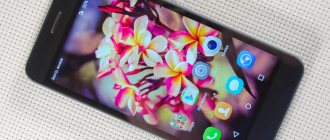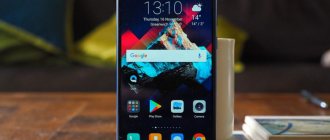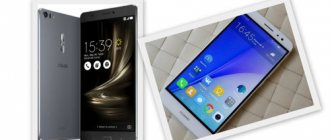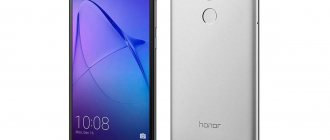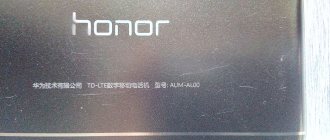Samsung branded smartphones are known for their quality and high performance. But the Korean company Honor has come close to leading companies. It increasingly turns out that the models of this manufacturer are superior to their rivals in some characteristics. And the price is lower. Let's consider which is better, Honor 10 vs Samsung A8.
Cost and design
Let's start comparing the two models with a review of their prices. Honor 10 is the company's flagship. Samsung Galaxy A8 is slightly above the average category, but does not reach the top devices (Both of them belong to the same price category. Honor is 27 thousand rubles in the 64 GB version and 30 thousand rubles with 128 GB. The price of the Samsung A8 is 25 thousand. rub.
Externally, the cases are similar, they have a rectangular shape and slightly rounded edges. Their height is 15 cm, width is 7 cm, the thickness of Honor 10 is 7.3 mm, Samsung is 8.4 mm. The latter is slightly heavier, 172 g versus 153 g.
The back cover of Honor is made of glass made in a special way. It consists of several layers, at the joints of which the sun's rays shimmer. Case color:
- Black
- Gray
- Blue with gradient
- Green with gradient
The main camera block is located horizontally at the top left. It consists of two sensors. The rim extends slightly beyond the plane of the lid. Next to it is an LED flash and the inscription AI CAMERA, below is the brand logo. On the right side of the Honor 10 there are power and volume buttons, on the left there is a slot for SIM cards.
Basic Features and Performance
Important criteria for comparing phones are basic specifications and level of performance.
SAMSUNG A8
The device is based on an 8-core Exynos 7885 processor with an operating frequency of 2.2/1.6 GHz cores. To support graphics, the smartphone is equipped with an ergonomic video controller Mali: G71. The user can choose the gadget from two configurations for built-in memory: 32 or 64 GB, while 4 GB of RAM is provided . Smartphone performance tests on Antutu show a result of 85389 points.
HONOR 10
The Chinese opponent is built on the Hisilicon Kirin 970 – an 8-core processor with an operating core frequency of 2.36/1.8 GHz. The Mali-G72 MP12 graphics coprocessor is responsible for image detail. RAM is provided 4 GB, built-in shares can be 64 or 128 GB depending on the configuration. Powerful architecture handles artificial intelligence support. According to Antutu performance tests, the Chinese new product significantly surpasses its opponent: 200,440 points versus 85 thousand points.
Summary! In terms of performance and storage capabilities for user content, the Chinese newcomer is superior to its opponent.
Screen Specifications
The screen of the Xonor 10 smartphone has a diagonal of 5.84". Resolution 2280 by 1080p, pixel density 432 ppi. The image on the screen is bright and colorful, the color rendition is rich due to the fact that the display is made on an IPS matrix. Not everyone likes the unibrow located in the center of the display. You can hide it in the settings. The sides of the screen are in a ratio of 19 to 9.
Samsung A8 is made on a SuperAmoled matrix. Display diagonal 5.6", size in pixels 1080x2220. The sides are in a ratio of 18.5 to 9.
Display Features
To choose the best model for yourself, they traditionally compare the parameters of device displays. The opponents in question are equipped with screens made using different technologies.
SAMSUNG A8
Branded screens from the Korean brand are superior in image quality to analogues from other manufacturers. The model in question is equipped with a display made using Samsung’s own technology. Screen diagonal - 5.6 inches, resolution - 2220x1080 pixels, density - 441 pixels per inch. The screen matrix has excellent color reproduction and lower power consumption.
HONOR 10
The Chinese model received a 5.85-inch screen with more modest characteristics: resolution - 2160x1080 pixels, density - 403 pixels per inch. But it stands out for its decent quality, good viewing angles and color rendition.
Summary! The display characteristics of the South Korean model are better.
Camera comparison
Samsung A8 has a main camera with a 16 megapixel sensor and a dual front camera with 16 + 8 megapixels. The additional sensor effectively blurs the background, and the pictures come out quite good. But they do not reach the quality of Honor 10. In low light they turn out grainy.
Honor 10 has a dual rear camera of 16 megapixels (color sensor) and a monochrome one of 24 megapixels. There is a phase focus. But there is no optical stabilization or zoom. The image quality is high day and night. The work of AI at first caused a lot of criticism. But over time it began to work much better.
Additional features
Both devices are “stuffed” with many interesting and convenient additional features. So, if the user wants to wake up the iPhone from a sleeping state, then he needs to press the power button and lift the smartphone in front of him (FaceID option). In this case, the screen should light up and recognize the owner’s face. In addition, the Apple device also has the following pleasant bonuses:
- the main camera is equipped with dual optical stabilization;
- the front camera, which supports portrait mode, also has automatic image stabilization and an exposure control option;
- the device supports wireless charging via Qi-compatible accessories;
- Video capabilities have also been improved: it supports playback of 4K movies at 60 frames per second, as well as slow-motion video at 240 frames per second.
As for Honor 10, for its 27 thousand rubles it has enormous capabilities. Firstly, the device has an NPU complemented by a neural module. This is a self-learning chip that supports artificial intelligence. Secondly, the smartphone is equipped with a dactyloscope (ultrasonic fingerprint scanner). The sensor is located on the front under the glass, has no protrusions or edges, and is one piece with the front panel.
READ MORE: 2021 reliability rating of rotary hammers for the home
On a note! Finger pattern recognition using ultrasound instead of optics provides more reliable information. In addition, such a sensor can detect even a wet or dirty fingerprint.
Honor has many more interesting user features, for example, voice control, gestures, one-hand control, the possibility of a second screen, an eye protection function, and so on. In addition, it is very convenient to take a screenshot by double tapping the screen with your knuckles.
Autonomy
The Honor 10 smartphone is powered by a 3400 mAh battery. From a full charge it will work for about a day. There is support for Super Charge. From zero to full recharge it will take 1 hour 20 minutes.
The battery capacity of the Samsung A8 is 3000 mAh. Moreover, it can work on one charge for up to two days. It also has disadvantages. Some applications drain your battery very quickly. To fully charge from zero it takes 1 hour 10 minutes, which is very slightly different from Honor.
Honor
According to the designers' idea, this 10 series smartphone can shimmer in different colors if a ray of sun hits it, but the main shade is not lost. The external difference between the device and its competitor is that its “unibrow” is less pronounced. The location of the keys for controlling the device is no different from other Chinese devices - the touch key located at the bottom of the screen has the shape of an oval, on the right side there are buttons responsible for lowering and increasing the volume level, as well as the power key, on the left there is a slot for two SIM cards At the top end there is an additional microphone and an infrared port. The bottom edge is reserved for:
- headphone input;
- power headset;
- main speaker;
- microphone for talking.
On the back panel in the upper right corner there is a dual camera, which protrudes above the general plane by a couple of millimeters. If the device is not used carefully, this factor can lead to damage to the optics. This model is available in four colors - green, black, gray, and blue.
Characterizing the dimensions of the new Honor 10, it can be noted that they are almost identical to the dimensions of the iPhone. The first has a length of 14.9 cm, while the competitor has 14.36 cm. The width is 71 mm versus 70.9 mm for the Apple smartphone. The thickness of the samples is 7.25 and 7.7 mm, respectively.
Summary! From the photo we can summarize that both phones look quite presentable, but the Apple device has a more laconic design solution, while Honor is designed in a youth style.
Comparison - Huawei honor 10 vs Samsung galaxy a8 (2020)
Huawei Honor 10 smartphone from 2021, weighing 153 g and measuring 149.6 x 71.2 x 7.7 mm. It is equipped with a 5.84 inch screen, 16 megapixel camera and 64/128 GB memory, 4/6 GB RAM and 8 GB RAM (GT version). Its processor is Octa-core (4×2.4 GHz Cortex-A73 & 4×1.8 GHz Cortex-A53)
For a complete comparison of all features, please view the table below
.
or
| General characteristics | |||
| release date | 2020, May | 2020, December | |
| Dimensions (H x W x D) | 149.6 X 71.2 X 7.7 mm | 159.9 X 75.7 X 8.3 mm | |
| Weight | 153 | 191 | |
| Frame | Front and back panels made of glass, aluminum frame | Front and back panels made of glass, aluminum frame | |
| Colors | Phantom Blue, Phantom Green, Midnight Black, Glacier Grey, Lily White (GT version only) | Black, orchid grey, gold, blue | |
| Battery | 3400 mAh, Non-removable, Li-Po | 3500 mAh, Non-removable, Li-Ion | |
| Battery life | Talk time - Up to 23 hours (3G) Audio playback - Up to 73 hours | ||
| approximate price | 400 EUR | 400 EUR | |
| Performance and components | |||
| Operating system (OS) | Android 8.1 (Oreo); EMUI 8.1 | Android 7.1.1 (Nougat) | |
| Chipset | — Hisilicon Kirin 970 (10 nm) | — Exynos 7885 Octa (14 nm) | |
| Processor CPU | — 8 core (4×2.4 GHz Cortex-A73 4×1.8 GHz Cortex-A53) | — 8 core (2×2.2 GHz Cortex-A73 6×1.6 GHz Cortex-A53) | |
| Video processor GPU | — Mali-G72 MP12 | - Mali-G71 | |
| External memory | No | microSD, up to 256 GB (dedicated slot) | |
| Inner memory | 64/128 GB, 4/6 GB RAM 8 GB RAM (GT version) | 64 GB, 6 GB RAM 32 GB, 4 GB RAM | |
| Antutu 8 | 222145 | 137850 | |
| Antutu 7 | 206587 | 116876 | |
| GeekBench 5 Single Core | 343 | 305 | |
| GeekBench 5 Multi-Core | 1374 | 950 | |
| GeekBench 4 Single Core | 1827 | 1455 | |
| GeekBench 4 Multi-Core | 6215 | 4083 | |
| GeekBench 4 RenderScript | 8457 | 3547 | |
| GeekBench 4 Battery | 3482 | ||
READ MORE: Review of Xiaomi Mi Band 4 (Mi Smart Band 4). One more step forward
| Screen | |||
| Technology | IPS LCD | Super AMOLED | |
| Touchscreen | yes, capacitive | yes, capacitive | |
| Number of colors | 16M | 16M | |
| Size (Diagonal) | 5.84″ (inches) | 6″ (inches) | |
| Screen area | 85.1 cm2 | 91.4 cm2 | |
| Aspect Ratio | 19:9 (Height:Width) | 18.5:9 (Height:Width) | |
| Screen/body ratio | 79.9% | 75.5% | |
| Resolution (pixels) | 1080 x 2280 px | 1080 x 2220 px | |
| Pixel Density | 432 PPI | 411 PPI | |
| Screen protection | Corning Gorilla Glass (Unspecified version) | Corning Gorilla Glass (Unspecified version) | |
| Other options | - Always-on display | ||
| Camera and video | |||
| Rear camera, basic | 16 MP, Dual camera | 16 MP, Single camera | |
| Camera Specifications | -16 MP, f/1.8, PDAF -24 MP B/W, f/1.8, PDAF | -16 MP, f/1.7, 26mm (wide angle), 1/2.8”, 1.12µm, PDAF | |
| Functions | LED flash, HDR, panoramas | LED flash, panoramas, HDR | |
| Video | [email protected] , [email protected] /60fps (gyro-EIS) | [email protected] | |
| Front camera, selfie | 24 MP, Single camera | 16 MP, Dual camera | |
| Specifications | -24 MP, f/2.0 | -16 MP, f/1.9, 27mm (wide angle), 1/3.1", 1.0µm -8 MP, f/1.9, 1/4.0", 1.12µm | |
| Video | [email protected] | [email protected] | |
| Communications and connections | |||
| SIM cards | Dual SIM (Nano-SIM, dual standby) | Single SIM (Nano-SIM)Dual SIM (Nano-SIM, dual standby) | |
| Communication standard | GSM/HSPA/LTE | GSM/HSPA/LTE | |
| Show all network frequencies: | |||
| Frequencies | -2G - GSM 850 / 900 / 1800 / 1900 - SIM 1 & SIM 2 -3G - HSDPA 850 / 900 / 1900 / 2100 -4G - LTE band 1(2100), 3(1800), 5(850), 7( 2600), 8(900), 19(800), 20(800), 38(2600), 40(2300), 41(2500) | -2G - GSM 850 / 900 / 1800 / 1900 - SIM 1 & SIM 2 (dual-SIM model only) -3G - HSDPA 850 / 900 / 1700(AWS) / 1900 / 2100 -4G - LTE band 1(2100), 2(1900), 3(1800), 4(1700/2100), 5(850), 7(2600), 8(900), 12(700), 13(700), 17(700), 18(800 ), 19(800), 20(800), 26(850), 28(700), 38(2600), 40(2300), 41(2500), 66(1700/2100) | |
| Speed | HSPA 42.2/5.76 Mbps, LTE-A (3CA) Cat16 1024/150 Mbps | HSPA 42.2/5.76 Mbps, LTE-A (3CA) Cat11 600/75 Mbps | |
| GPRS | Yes | Yes | |
| Edge | Yes | Yes | |
| WiFi | Wi-Fi 802.11 a/b/g/n/ac, dual-band, WiFi Direct, hotspot | Wi-Fi 802.11 a/b/g/n/ac, dual-band, WiFi Direct, hotspot | |
| GPS | Yes, with A-GPS, GLONASS, BDS | Yes, with A-GPS, GLONASS, BDS | |
| NFC | Yes | Yes | |
| USB | 2.0, Type-C 1.0 reversible connector, USB On-The-Go | 2.0, Type-C 1.0 reversible connector | |
| Bluetooth | 4.2, A2DP, aptX HD, LE | 5.0, A2DP, EDR, LE | |
| Harmful radiation | SAR EU - 0.32 W/kg (head) 1.30 W/kg (body) | ||
| Music and audio | |||
| Radio | No | FM radio | |
| 3.5mm audio jack | Yes | Yes | |
| Another | — Active noise reduction with dedicated microphone -32-bit/192kHz audio | - 24-bit/192kHz audio - Active noise cancellation with dedicated microphone | |
| Other Features | |||
| Sensors | — Fingerprint scanner (front-mounted), accelerometer, gyroscope, proximity sensor, compass, infrared port | — Fingerprint scanner (rear-mounted), accelerometer, gyro, proximity sensor, compass, barometer | |
| Other Addons | — Fast battery charging: 50% in 24 minutes (5V/4.5A) | — Fast battery charging -ANT — Samsung Pay -IP68 Water and dust protection (up to 1.5m in 30 min) | |
| Versions | — For Global market | — Versions: A730F (Global Single-SIM); A730F/DS (Global Dual-SIM). Other names: Samsung Galaxy A8 (2020) Duos with dual-SIM card slots | |
